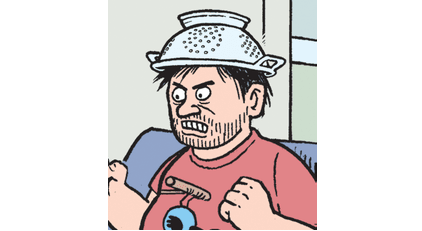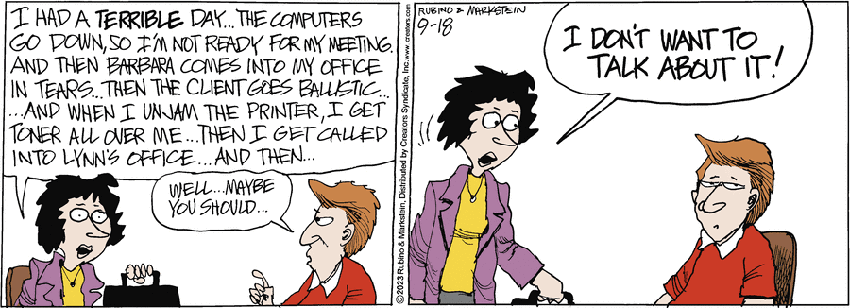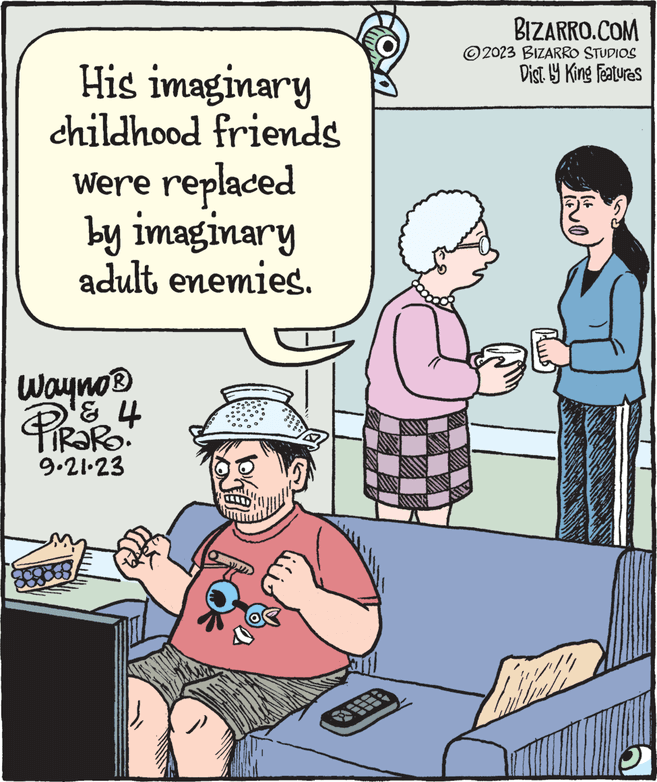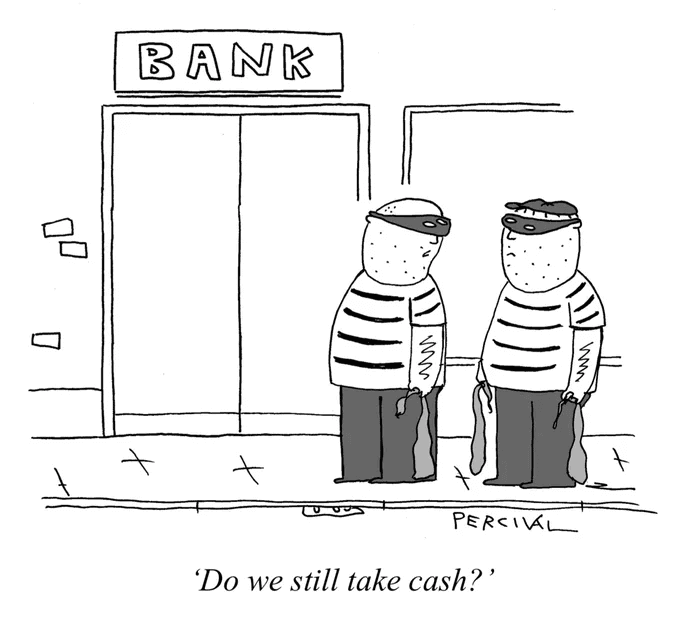Offer to make dinner. Offer to rub her shoulders. Just don’t offer advice. You’re stepping on a rake.
Daddy’s Home (Creators) demonstrates something I learned from Deborah Tannen’s 1986 book, That’s Not What I Meant, an analysis of men’s and women’s conversational styles that has since been echoed and confirmed, though mostly by other feminist writers.
I’m not sure very many men have gotten the word, and given that it’s been nearly 40 years since Tannen first appeared on the scene, there are a lot of guys young enough to have grown up knowing this stuff. But who didn’t.
As she explained, women focus on feelings. They share their frustrations with no goal other than to let you know where they’re at so you can sympathize.
By contrast, men talk mainly to convey information. They keep their problems bottled up while they search for a solution, only voicing them when they’ve given up and are asking for help. There is a small humiliation in doing so, which is the root of a common complaint about men, mostly by their wives.
I had a conversation about this with Hilary Price some years ago which resulted in this Rhymes with Orange (KFS):
And that, dear friends, is the difference between men and women, though I am sure there will be people of each gender protesting that Tannen is completely wrong.
Which is why we all — regardless of gender — keep stepping on that particular rake.
Some guys — like this one in Bizarro (KFS) — never outgrow their inner fear that everyone is trying to be superior to them, which is a figment of their own imagination, though that doesn’t make it any less real to them.
I think the obsessive feeling that people are being deliberately mean to you is unisex and that neither has a corner on that one. Some see massive Deep State plots everywhere, others are burdened by microaggressions, everyone is stepping on rakes that they mostly placed there themselves.
Can’t we talk about something less pleasant?
While other editorial cartoonists are arguing over whether UAW workers are overpaid or being exploited — we’ll get to that another day — David Horsey takes a broader view of the growing disparity between those at the bottom and those at the top.
That other argument centers on CEOs who earn 400 times what their workers make, but there is also a gulf between those who don’t have enough and those who do, and Horsey does well to use homes as a symbol, because that’s a place in which it really stands out.
I got a laugh the other night when the news reported approval of a housing project in which a certain percent of the units “would be affordable.” The other units, I guess, are not, which says more than either the builder or the newscaster intended.
Megan Herbert referenced an Aussie broadcaster on Twitter:
She’s right and he’s right and I remember when the guideline was that we were supposed to spend a third of our income on housing.
Fat chance these days, except for those who don’t need “affordable” housing.
It’s a matter of both microaggressions and macroaggressions. I suspect much of our sociopolitical division comes from resentment of people who, like the good citizens of this Liana Finck city, are surrounded by opportunities to piss away their money on crap nobody needs.
And who don’t hesitate to fill their $500,000 homes with exotic, unnecessary stuff because they can, without budgeting or even bothering to think it over.
While, speaking of stepping on rakes …
The woman in this Moderately Confused (AMS) at least has some fun toys to cuddle with or give to grandchildren. I don’t think Beanie Babies are durable enough to make good dog toys.
But what they are definitely not durable enough for is investments, and while it might be disappointing to have bought them off the shelf hoping they’d become more valuable, it must be even moreso to have bought the things at above-market prices from other hoarders.
Though, if it’s any comfort, the people who purchased NFTs are now coming down to Earth, as a new report says that things which were not of any value then are definitely of no value now.
Unless you stepped on that particular rake, you might get a laugh out of the fact that the report is citing the value of NFTs in cryptocurrency, which summons up a “hold my beer” joke and another painful bonk in the forehead.
One of the few collectibles that appears to have held its value is baseball cards, which are valuable because, as this Twitter posting notes, we didn’t think of them as “collectibles” back when they were issued.
And, even so, both baseball cards and comic books — another survivor of reality — share the factor that to be valuable, you have to have not liked them very much. If you didn’t keep them in absolutely pristine condition, they’re not all that valuable.
The ones that are worth the most were issued back before collectors began amassing them as investments but whose original owners didn’t ruin them by, in the case of baseball cards, carrying them around in their pockets or, in the case of comics, (gasp!) reading them.
The nice thing about cash, to answer the question in this Matt Percival cartoon, is that it remains fungible even if it’s been used, though I guess you’d better hurry while that remains true.
There are now places that don’t take cash and people who don’t carry it anyway, among whom I count myself. I’ve even been getting a 10-cent-per-gallon discount for using a gas station card that skips the Mastercard/Visa fees and debits straight from my bank account.
The AARP has an article on the topic that sounds like one of the Progressive ads to keep you from becoming your parents, but it does break it all down well.
And here’s a curmudgeon who is against the trend and makes some good points both about using cash to budget efficiently and against the corporations who are trying to stamp it out.
He’s right about one thing: Cash doesn’t leave a trail. If you’re obsessed with privacy but using debit and credit cards, you might want to do some pondering.
Though being continually broke minimizes the issue.










There are a lot of folks who do not carry any cash on them. None. I work at a library, and people use a card to pay for a 25-cent photocopy.
Almost every time I go to the grocery store and pay in cash, the young cashier always pauses for a moment, looking perplexed, trying to think of what they’re supposed to do with it.
I spent a few hours at a comic book convention the other weekend, my wallet, only housing five credit cards and no cash the rest of the year, filled with twenties and fifties. The few purchases I made were amusing in that, like all of the bills in my wallet, the cash I received as change consisted entirely of brand new bills. Nobody uses it in daily life because there’s no point. You can’t get actual currency anywhere except a bank, and mine is closing its local branch in two months. The effort to get it is only worth it if you can’t use a card instead. Comic-book sellers need that extra 3-5% credit-card companies deduct from each purchase; regular businesses simply consider it the price of doing business. Besides, with a credit card, you can spend money you don’t have. By definition, you can’t do that with cash, wrinkled or new.
Beanie Babies will definitely not survive two minutes with a dog. A 2-year-old human got a hold of one my husband had put out as holiday decor for the family Christmas dinner. If it had ever had a chance of being worth something someday, that possibility was rendered moot very quickly.
As the old saying goes, we agree with Wiley Miller (we always do), For us cash is king.
And, i take exception to the Bizarro cartoon character as insulting by demeaning religious headgear. As anyone knows the colander is the official sacred headgear of the Church of the Flying Spaghetti Monster! (though we are not members, they are as, or more, legitimate as a religion as any)
So.how will I give my grandchildren a few dollars for their birthday? How will I give kids pocket money? Give to a busker or homeless person? I would normally drop a couple of dollars to someone collecting for charity, but I would feel mean putting such a small amount on a card so they miss out.
That’s what gift cards are for! …if you want them to have to spend the money at a specific place, that is…
You can give your kids a debit card that you refill, assuming “pocket money” is how you want them to learn to budget for toiletries, hair cuts and such. I’ve given a grocery store gift card to a panhandler I saw often, bought a burger for random homeless people on the street.